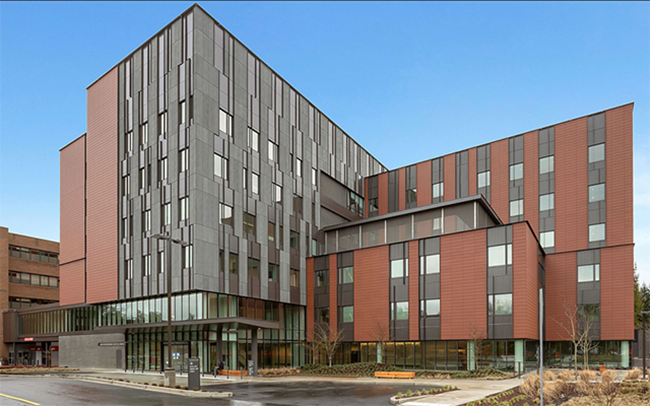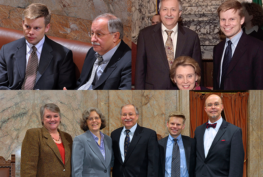Dear friends and neighbors,
Everyone should have access to quality, affordable health care. During this year’s legislative session, we continued to make progress toward that goal with legislation to support health care workers, reduce wait times for care, increase access to behavioral health treatment and crisis centers, and ensure access to reproductive care and telemedicine. This newsletter is longer than normal because we made a lot of progress in this area!
Investing in quality care
The University of Washington’s new Center for Behavioral Health and Learning will expand care for individuals living with serious mental illness. The state legislature funded this teaching hospital not only to care for patients, but also to build and refresh our workforce by giving young mental health professionals a chance for hands-on learning. I’m excited to see the new 150-bed facility on the UWMC-Northwest campus start accepting patients in June.
This year’s operating budget provides a total of $82 million in behavioral health community capacity grants, to build more behavioral health care facilities in communities across Washington. The budget also includes $60 million for Harborview Medical Center to support their critical safety net care for the state and region. An additional $2.5 million will expand UW’s School of Dentistry’s Regional Initiatives in Dental Education (RIDE) program, which trains dentists to serve the state’s rural and underserved populations.
Expanding access
- SB 5481 establishes the Uniform Telehealth Law to expand access to medical providers while ensuring that healthcare directed by anyone outside the state meet the standards of care provided by those within Washington state. This makes our state the first in the nation to pass the Uniform Law Commission’s legislation to provide clear authorization for telehealth.
- SB 5580 expands access to pre- and post-natal care for some of the most vulnerable pregnant people in our state by raising the income ceiling for Apple Health eligibility and creating supports for those suffering from substance use disorder.
- SB 5821 ensures that audio-only telemedicine services established during the pandemic remain accessible in Washington and follow uniform standards for medical care.
- SB 6228 makes numerous improvements to the state’s struggling substance use disorder treatment system by providing new protections for patients seeking care in the community.
- SB 6127 expands access to post-exposure prophylaxis (PEP) medication that can prevent HIV infection if taken immediately after potential HIV exposure. This bill requires insurers to cover the medication at no charge to the patient and mandates that hospitals dispense the medication as appropriate to patients in emergency settings.
Reproductive care
- SB 6151 will protect people from unskilled medical practices by prohibiting unlicensed or unsupervised people from performing ultrasounds.
- HB 1954 will protect medical professionals and preserve access to reproductive care by prohibiting professional disciplinary action against a healthcare worker for providing reproductive care that is legal in Washington state.
- HB 2115 will allow the substitution of a health care facility name in place of a prescriber’s name on a prescription label for abortion medication to protect prescribers from harassment or worse, a growing concern since the U.S. Supreme Court overturned Roe v. Wade.
Public health
- SB 5983 provides new tools for public health organizations to combat sexually transmitted infections in Washington by expanding the ability of medical assistants to treat syphilis infections and by allowing prescribers to utilize expedited partner therapy where appropriate.
- SB 5271 allows the Department of Health to align its existing enforcement tools across the spectrum of facilities it regulates. These progressive enforcement tools will better protect patients while safeguarding access to care.
- SB 6095 expands the authority of the Secretary of the Department of Health to issue a standing order during an emergency situation. This tool will allow the secretary to better support the ability of local public health agencies and employees in controlling and preventing the spread of diseases or threats to public health.
Workforce and facilities
- SB 5184 addresses a critical workforce shortage by establishing the profession of anesthesiologist assistants in Washington.
- SB 5853 expands on the work done in the 2023 session to create 23-hour Crisis Relief Centers for adults by enabling the licensure of comparable centers to serve minors.
- SB 5940 helps rural hospitals maintain workforce levels and provide employment for local residents by allowing the hiring of highly trained volunteer emergency medical technicians as medical assistants in appropriate settings.
- SB 6178 expands access to care by allowing licensed midwives to prescribe appropriate medications to patients.
- SB 6286 will increase the availability of nurse anesthetists by directing the Washington State Board of Nursing to develop and manage a preceptorship program.
Thanks for taking the time to read my newsletter. If you missed my previous updates on gun safety, public education, environmental protections, affordable housing, LGBTQ+ rights, public safety, or transportation, they are available on my website. Please reach out with any questions at Jamie.Pedersen@leg.wa.gov.
Best wishes,
Jamie




